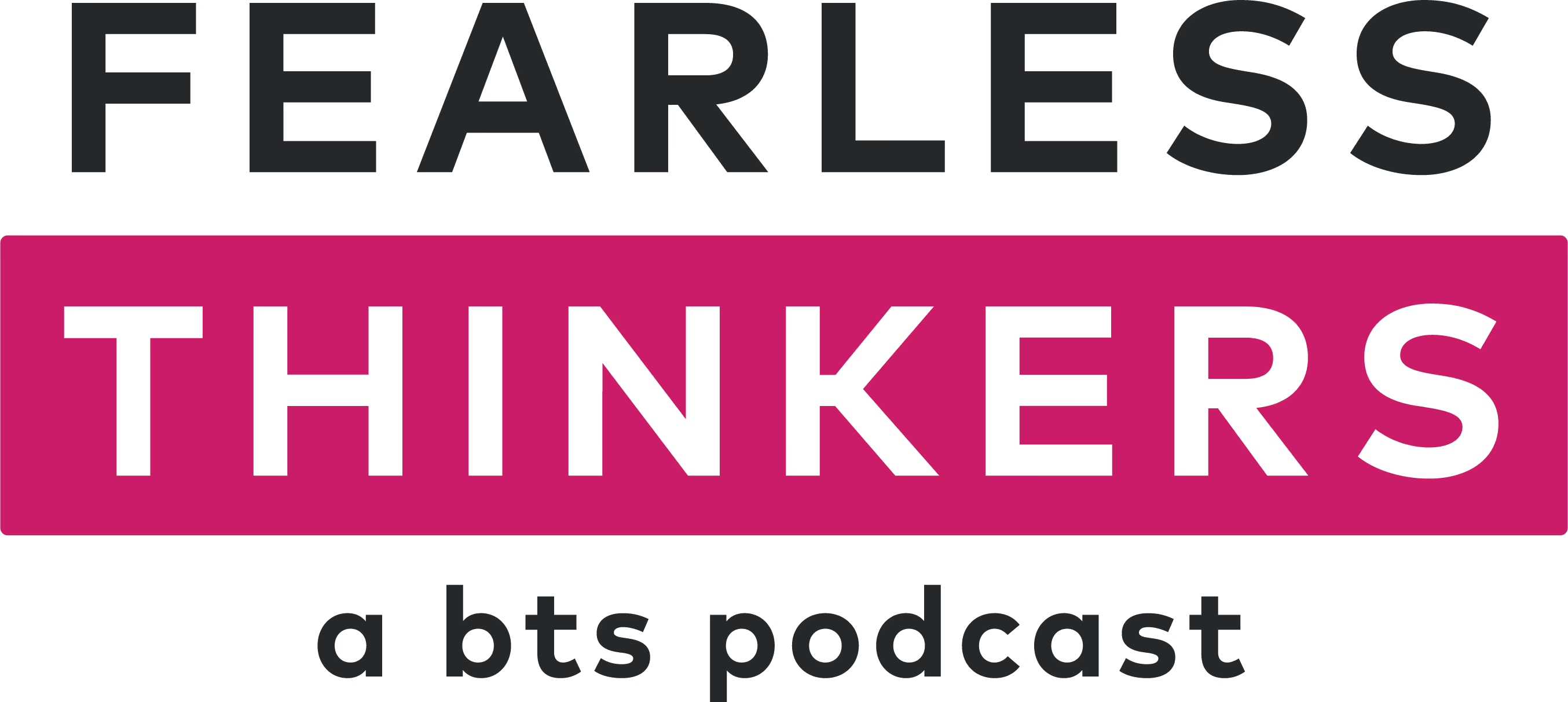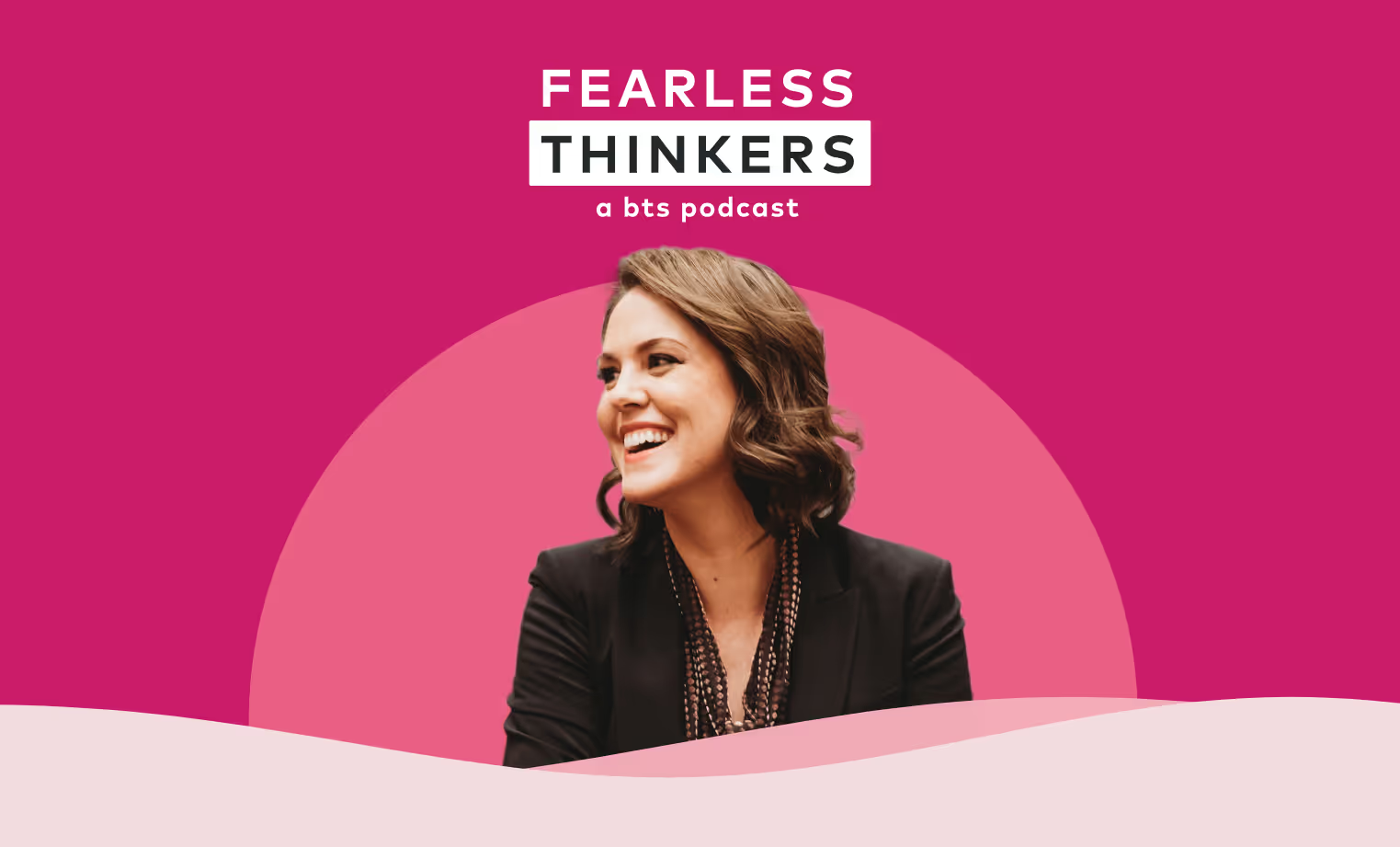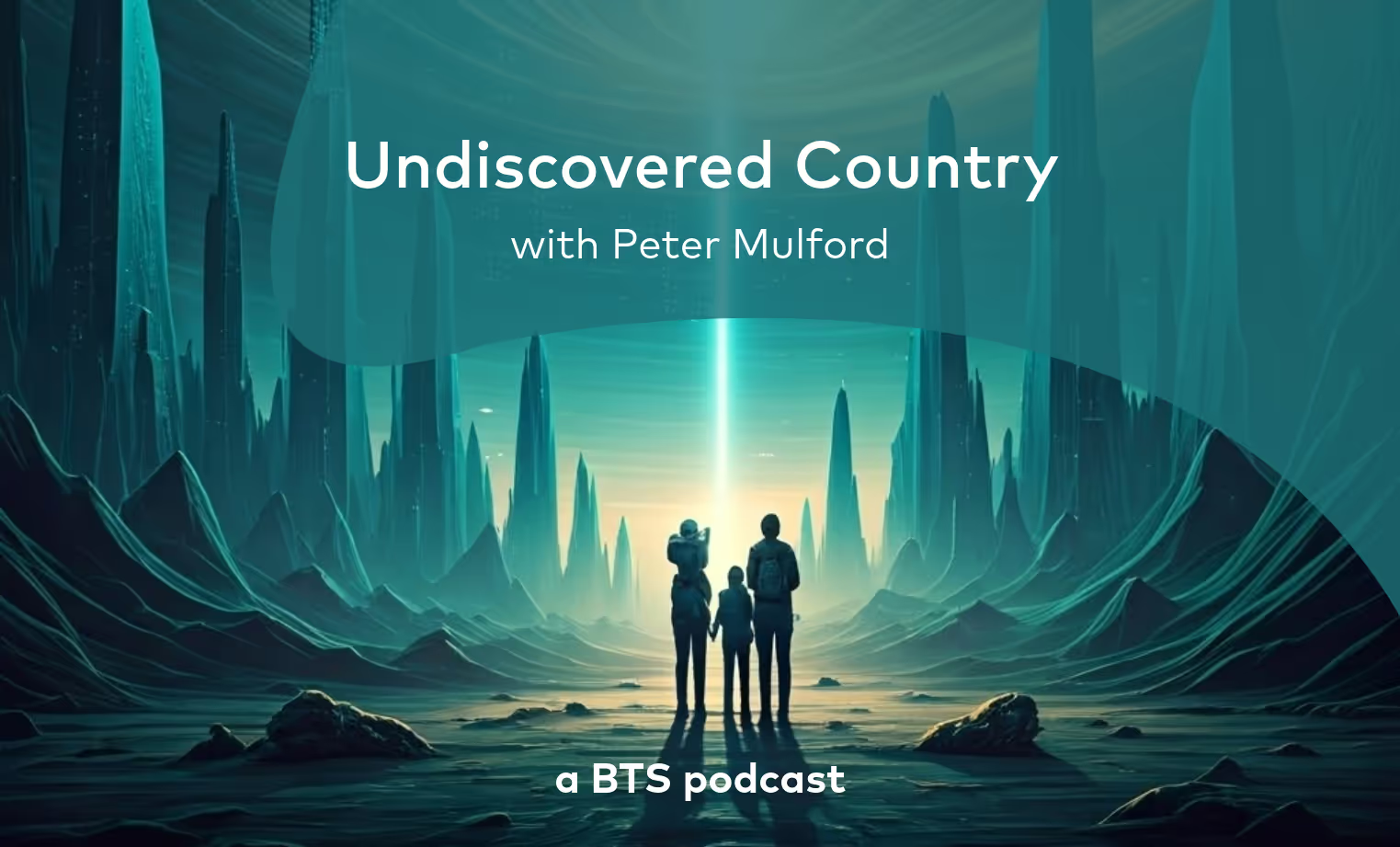The Rainforest Trust and BTS: a partnership

In this episode of Fearless Thinkers, Beth Bush, Senior Director of Philanthropy at Rainforest Trust, and Xenia Roman Korobochkina, Senior Director at BTS, share about everything from the origins and ongoing fruits of the partnership (including the preservation of 35 million trees), to recent encounters with bromelias and tamarins, to ways that you, too, can help nature sustain itself.

Most of us want to lead in a way that matters; to lift others up and build something people want to be part of.But too often, we’re socialized (explicitly or not) to lead a certain way: play it safe, stick to what’s proven, and avoid the questions that really need asking.
This podcast is about the people and ideas changing that story. We call them fearless thinkers.
Our guests are boundary-pushers, system challengers, and curious minds who look at today’s challenges and ask, “What if there is a better way?”If that’s the energy you’re looking for, you’ve come to the right place.
Masami Cookson: Welcome to “Fearless Thinkers,” the BTS podcast. My name is Masami Cookson, and our host is Rick Cheatham, head of marketing at BTS. On today’s show, Rick has a conversation with Beth Bush and Xenia Roman Korobochkina. Beth Bush is the senior director of philanthropy for Rainforest Trust, an organization committed to saving endangered wildlife and protecting the planet by creating rainforest reserves through partnerships, community engagement, and donor support. Beth has managed nonprofits focused on international humanitarianism, rare diseases, cancer, children in the foster care system, and epilepsy. Xenia Roman Korobochkina is a senior director at BTS. She partners with multinational clients across industries such as consumer goods, manufacturing, and pharma to help them achieve better business results through customized simulations. Prior to BTS, Xenia worked for the US-Mexico Chamber of Commerce. She is a native Spanish and Russian speaker. How’s it going today, Rick?
Rick Cheatham: I’m doing really great, Masami, and frankly couldn’t be more excited about this episode. My whole life and education background was focused on ecology, and then the environment. My big dream was to work for Texas Parks & Wildlife. One of the coolest things on this show today is that Beth talks about not only how they’re preserving this land but they’re also preserving community and culture and helping the people who’ve lived on the land for generations to maintain it in a way that’s good for them and good for the environment. So really, really cool stuff. So, I’d say [let’s] go.
Masami: Let’s do it.
Rick: Xenia, Beth, welcome to the show.
Xenia & Beth: Thank you, Rick.
Rick: So what’s going on in your world today, Xenia? Where are you?
Xenia: Well, Rick, I am actually in our office in New York, the 50th floor at the Empire State Building. Lovely views. It’s supposed to rain today, but it hasn’t. Getting some work done.
Rick: Ah, springtime in New York is always wonderful. How about you, Beth?
Beth: Hi, Rick. I’m home. I work remotely from my home in Florida, and it is a nice, beautiful rainy day here in Florida.
Rick: I was just in Florida a couple of weeks ago, and so, so happy to be there. Beth, I would love for you to tell our listeners a little bit about the work you do and about Rainforest Trust.
Beth: So, Rainforest Trust is an international conservation organization. We were founded 35 years ago for the purpose of saving endangered species. We do that by saving their habitat, so we are laser-focused on preventing deforestation. We protect land either by working with governments and local community conservation organizations to create a designation, like a national park or a reserve. We also have — what are my favorite — land titling projects, where we work with communities who have inhabited lands throughout their entire life of generations of families, but they’ve never had legal rights to the land. And so, we help them with that. And then when it’s available, we also do land purchases, although we don’t own the land. It’s owned locally by the conservation organizations that are there in that area. To date, we’ve saved over 45 million acres of land. We work primarily through Central and South America, Asia, Africa, although we have a few projects sprinkled in, like Puerto Rico, Mexico, and a few other countries.
Rick: I’m familiar both with the concept of purchasing the land and, of course, working through governments to protect the land. I’m not as familiar with the concept of land titling. Could you share a little bit more about that?
Beth: So as an example, in Peru, there are many indigenous communities that have lived in areas that need to be protected for generations after generation, but they’ve not had legal titles to their land. So, mining companies can come in, companies can come in and cut down the trees, people can come in and poach the animals, which causes a lot of problems. And so, we work with communities to create what’s called a life plan. And a life plan is where they say, “Okay, here’s the land that needs protected. We’re gonna agree that we live here over on this part. We’ll do our sustainable farming over here. We will maybe do ecotourism to help us raise money to live and to protect the land long term. And then maybe here’s a part of the land that we agree we’re not gonna touch at all.”
Rick: That’s just incredibly inspiring when I think about not only protecting and preserving the land but also protecting and preserving these communities and not displacing these folks and having them ending up in the city or, you know, frankly worse.
Beth: Yeah, I mean, in most cases, they’ve spent their lives protecting that area anyway, so why wouldn’t we want to help them have the tools to be able to do it legally? And it not only protects them and creates a protected area but it creates all of the endangered species within the biodiversity that the area holds. It just does a tremendous amount for the world.
Rick: I love it. Xenia, you’ve been a part of the BTS relationship with Rainforest Trust from the beginning. Help us understand a little bit about how you became involved and what we at BTS are doing.
Xenia: Yes, it’s been the privilege that I’ve had almost since I joined BTS. So it’s been 11 years since I joined it, 12 years since we had started partnering with Rainforest Trust. And it was a big driver as to why I even wanted to be part of this company, of BTS, because I had seen that we aligned in values, right? In terms of wanting to care for more than business. Of course, we value our clients and different stakeholders, but also our planet. As you know, and our audience probably [does] too, at BTS, we’re committed to helping organizations achieve their objectives by inspiring and equipping their people to do the best work of their lives. And Rainforest Trust uses collaboration and partnerships on the ground with those local organizations and communities to achieve the mission that they care for.
Rick: You went down recently to Brazil to actually see in real life the work being done. Do you mind telling us a little bit about that?
Xenia: Absolutely, this had been a dream probably for the last decade of a few of us in the organization to get to see and witness and understand is this truly making a difference? And so, Beth helped us coordinate a visit to Brazil. We went to the Atlantic Rainforest and got to meet two of their partners on the ground. We got to explore and visit the rainforest, some of these areas that have been, in this case, actually reforested, and to see the impact and the passion with which these organizations do the work and learn about how they then involve further the local communities and different just stakeholders across the region.
Rick: Years ago, I took my family to Costa Rica to a farm on land that had once been stripped. Being able to see and experience that firsthand, I know, was a very significant moment for my kids.
Xenia: It really was. One of the organizations that we visited, AMLD, focuses more specifically on protecting the golden lion tamarins, which is an endangered species. And we got to see them, a couple of families of these tamarins now enjoying the fact that they had an area where they can continue just expanding and reproducing. And that was just one example of it. We then also visited nurseries where the same organization is partnering with an even smaller local organization in experimenting and innovating on how do they help after reforesting bromelias to life and continue growing faster and regenerating the full environment there. I didn’t even know bromelias were before this. And I do love flora and fauna in the world, but it was a whole other layer of it. And furthermore, the executive director at this organization, Luis, was sharing how he was so excited because, as they were experimenting with this, he made a connection to a local university and the researchers there who came in and visited the nursery and helped them try out new techniques. And so, you start seeing how all of these different stakeholders in the community connect in different ways and how all of it together starts just making a bigger and bigger exponential impact.
Beth: Yeah, it was a really, it was a wonderful experience for me as well. You know, I sit in an office and I work on corporate partnerships, because we just can’t do what we do without the companies that support us. But I’m not out in the field. So to have the opportunity to travel with BTS and see the partners and see the important work that we’re doing was just really a once-in-a-lifetime experience. We were able to look out at the mountains and see beautiful forests that were still intact, and then almost a line through the mountain where you could see where everything had been cut down. And then you could see other areas of different shades of green where it had been reforested. It was wonderful to see all the work being done to reforest the other areas. I learned a lot, just like Xenia did, the nurseries, all the people involved. And then I thought, “Wow, imagine the expense and the human resources and all the things that we have to do to reforest areas that, had we simply protected in the first place, we wouldn’t have to do that.
Rick: Preservation is, I’m sure, exponentially easier and better than the reforestation.
Beth: Well, we’re at a point where we need them both, right?
Rick: Yeah, of course.
Beth: But yeah, I mean, the clock is ticking. Over half of the world’s rainforests have disappeared and we’re at a point where, if we don’t do something right now, the young people that are alive today will see the end of rainforests. Rainforest will no longer exist in the next 100 years. And I say rainforests, and that’s part of our name, but we’re really all about forests, rivers, oceans, any habitat that we need to preserve for nature.
Xenia: The second partner that we got to visit on the ground, for instance, REGUA [Reserva Ecológica de Guapiaçu]… Something very cool that stood out when we were having conversations with them and just walking around and seeing the area was the rationale and the vision behind their purpose. And it had a lot more to do with providing water to two million people in that region, right? To Beth’s point, it almost becomes, if you think about why this makes sense to do and why it really matters now, the evident aspect of planet, then how are we doing it through people and how it engages the community. And then the last piece was, maybe we counterintuitively profit, right? Something that the founder of the organization shared, Nicholas, was this constant challenge or battle that he has in terms of helping people see why this even matters, even if you were trying to look at it with a business lens. Some of the challenges they face is that the land, if it was used for pasture and then they let it regrow and let nature do its thing and it becomes again forested, it becomes less valuable in terms of dollars. And so then sometimes owners don’t see why would they even enable this to happen? But if you think about it, it’s hard to put a dollar amount to it because the value of having nature sustain itself and do its job for us and then keep providing us with clean water is priceless.
Beth: Yeah, that’s a great story, Xenia. We also have projects in Madagascar are a really good example where there were farmers and they wanted to be able to cut down trees there so that they could farm more and have more agriculture. We tried doing community education and talking about the importance of the land, but they also needed to make a living for their families. And so, more and more and more trees were cut down to a point finally where, as it rained, there were no trees to catch the rain or slow the rain and the farmlands flooded. And then the communities were like, “Ah, okay, we get it. Now what do we do?” And so, it’s a good combination of making sure people are educated and understand the impact of destroying nature, but also making sure that people have a way of taking care of themselves and their families in conjunction with nature.
Rick: So, I’m wondering if you could tell us a little bit about the outcomes.
Xenia: You know, it’s been 12 years that we’ve been partnering with Rainforest Trust and that has translated into over 100,000 protected acres of rainforest globally. It was very cool to learn recently that Rainforest Trust had begun calculating the carbon in protected areas, over 12 million tons. Being a professional services organization with the travel that we incur that is required for business, we were looking to understand, “Well, what can we do to make up for some of that? If we continue measuring about how much travel does it require compared to how much we are able to offset, we’ve been managing to do quite a good job.
Beth: Now, BTS has created an incredible, incredible impact. And beyond the things that you’ve already mentioned, you know, I hear some companies, they get excited and they want to plant trees so that they can say, “Oh, we’ve planted X number of trees.” And that’s great, but you have saved trees — over 35 million trees are still standing because of the efforts of BTS.
Rick: Wow, I’m such a nerd I have chills. That’s awesome.
Beth: For the cost of planting a tree that may or may not survive that may take years to be able to sequester carbon, you can protect one acre of land that has 500 to 1,000 trees on it.
Rick: I’m wondering if you guys could share a little bit more about what’s possible or what could be next for the partnership between BTS and Rainforest Trust.
Xenia: There’s a clear opportunity for us to use our capabilities, the work that we do for our clients to support Rainforest Trust and their partners in building some of their own on the ground, getting the people in these communities and organizations to do the best work of their lives. Stay tuned, hopefully we can get started also leveraging more of our BTSers around the world as well in terms of partnering with Rainforest Trust more closely and making this happen.
Beth: And we’re so excited that that’s a conversation that you’re having internally and something that’s top of mind for you. Because, just like we can’t do what we do without support from companies, we definitely couldn’t do it without the local conservation organizations that are on the ground doing the day-to-day work. And sometimes they’re really strong organizations. Other times, they were started by a scientist who likes a particular animal or a farmer who saw the need to preserve land or someone else who just happens to love nature or love a particular species. So, they’re not always organizations that have a really strong background in business management. They need help with things like fundraising and accounting and human resources and the use of technology. It benefits all of us when companies get involved and really support the kind of efforts to protect biodiversity, protect nature, and let it do its job. So we appreciate any companies that want to partner with us, whether it’s a partnership where they’d like to donate and be able to talk about the impact that those donations create, or whether they’re also interested in perhaps pro bono works, like BTS is considering as well.
Rick: Well, thank you both for taking the time to sit down with us today. Really, really appreciate it.
Beth: Thank you so much, Rick. We really appreciate the opportunity to not only work with BTS, but to be on here with you today and tell our story a little bit more.
Xenia: And thank you, Beth, and Rainforest Trust for letting us partner with you and making us feel part of making an impact.
Masami: If you’d like to stay up to date on the latest from the “Fearless Thinkers” podcast, please subscribe. Links to all the relevant content discussed in today’s podcast are in the show notes where you’ll also find a link to donate to Rainforest Trust. In addition, you can always reach us at BTS.com. Thanks again.
Related Content

lorem ipsum

lorem ipsum

lorem ipsum




.svg)